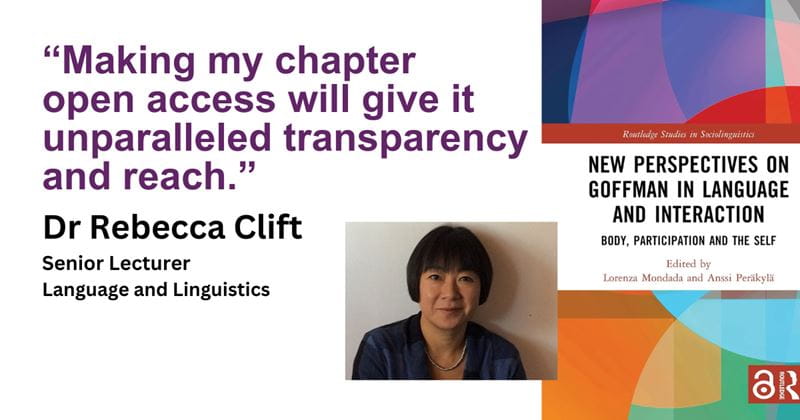Contributing to Goffman with the Open Access Fund

The Open Access Team (part of Research Services, University of Essex Library Services) have recently announced the publication of another work funded by the Essex’s institutional Open Access Fund. The latest publication, a chapter by Dr Rebecca Clift, Senior Lecturer in the Department of Language and Linguistics, contributes to a major new essay collection from Routledge.
In this blog post, Dr Clift tells us about her work and the particular significance of making it Open Access.
The next chapter

"I was delighted that the University of Essex was able to publish my chapter, ‘Embodied scepticism: Facial expression and response relevance’ in the book New Perspectives on Goffman in Language and Interaction Open Access."
"As one of the great social theorists of the twentieth century, Erving Goffman (1922-1982) is, in this volume, reappraised, forty years after his death, in the light of recent work on social interaction. That this chapter is available Open Access will make it so much more reachable for those, worldwide, wanting to learn more about Goffman and his legacy."
"Goffman’s insistence that the study of face-to-face interaction – ‘the interaction order’ (1983) – could be an independent domain of analytic investigation in its own right, and not a reflection of psychology, sociology or linguistics, is key in the development of Conversation Analysis (CA), my research method, as an autonomous field of inquiry. In the face of a prevailing assumption in mid-twentieth-century sociology and linguistics that interaction is too disorderly to yield to systematic analysis, Goffman insisted that the interaction order is a visible institution in its own right, like the family, education, or the legal system. And this particular institution – social interaction – is the medium through which the business of these others is transacted. The volume is a celebration of Goffman’s vision in the light of evolving technology and new research methods. In the years since he was writing, the field of Conversation Analysis has made audio and video recordings the starting point for analysis, and so can bring to Goffman’s insights the rigour of analysis derived from repeated inspection of materials."
"In my own research I’m doing exactly this: I’m examining 183 hours of footage filmed continuously on 28 cameras in the homes of British families over several months to study the intersection of the verbal and the non-verbal (so called ‘embodiment’). I say to my students, that, thanks to David Attenborough, we know how lions bring down antelopes – but we don’t know so much about how interaction over the family dinner table is organised. If you’re asking me a question as I’m reaching for a glass and someone else is passing me a plate, how do I organise those different streams of activity in response? My contribution to the Goffman volume uses this and other filmed data to examine facial expression (about which there has been surprisingly little written) in a particular interactional context. This facial expression is recognisable as a display of scepticism and has particular interactional implications."
"I taught a CA workshop in China a few years ago alongside colleagues from the Universities of York and Colorado, and we were very struck by the lively interest in CA from the dozens of people – faculty and students – who attended. As CA is in its infancy in China, there are many who are interested in working with it, but who don’t have access to institutional support. CA is an extraordinarily transparent method – the transcripts of the data are always available alongside the analysis, allowing the reader to come to their own (potentially distinct!) conclusions. So, making this chapter Open Access will give it unparalleled transparency and reach. And thanks to the open access team, the whole process was extraordinarily smooth and efficient."
You can download and read Dr Rebecca Clift’s chapter from the publisher’s webpage.
Get published Open Access
Do you want to publish your work Open Access? Just complete this brief form and the Open Access team will soon be in touch.
More information about making your research available open access can be found on the Open Access Publishing webpage, and you can also get in touch with the OA team via oapublish@essex.ac.uk.
To keep up to date with news on open access publishing, follow Library Services on LinkedIn.



